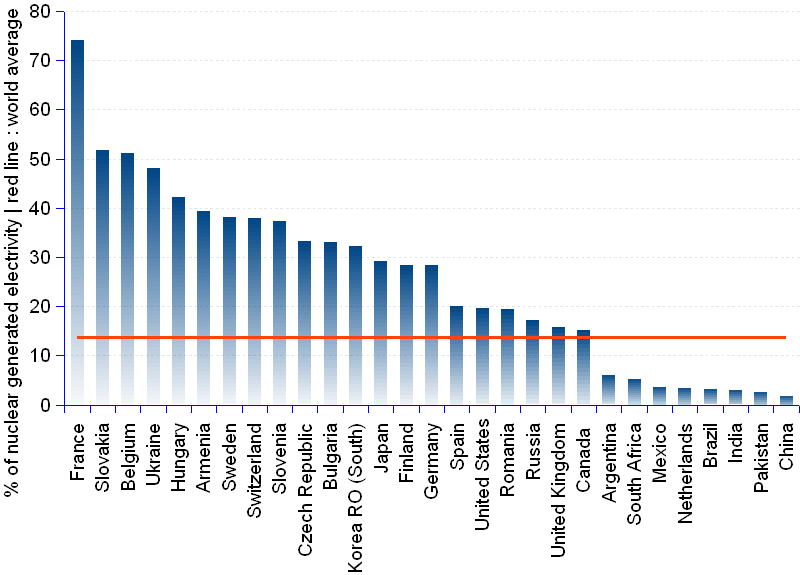

Nuclear nations depend upon nuclear power to generate an average of 14% of their electricity needs. This average hides a variety of situations, extending from France, where 74% of electricity is nuclear, down to China where the share of nuclear electricity is only 1.8% – as yet, leaving out Chinese plans to build huge nuclear capacity –.
Overall more than two thirds of the world 30 nuclear powers rely on nuclear reactors to supply a share of electricity higher than the world average 14%. This is a serious issue, given the shortage of energy alternatives. Oil and gas are inexorably getting scarcer and less affordable. The imperative to control air pollution raises obstacles to the use of traditional coal fired plants. The solar, wind and tidal energies, reputedly clean and renewable, have yet to achieve a technological breakthrough to become cost-efficient and high-performance alternatives. Hence nuclear proponents hammer their arguments, advocating the renewal of exploitation licenses for old installed reactors and the steady construction of new plants, insisting that nuclear power is both clean and cheap.
The concept that any of the above energy forms may be "clean" is wishful thinking. One may be less pollutant than the other, but all of them require heavy industrial processes to transform oil, gas, coal, wind, or solar energy into usable thermal or mechanical energy. Even photovoltaic cells or eolian towers do not grow from trees. Nuclear power, however, is likely the less clean of all. Nuclear sponsors do not say much about the uncleanliness of the 77,000 mi² (199,429.85 km²) of soil contaminated by the Chernobyl radioactive fallout, and they remain cautiously discreet about the huge masses of soil, sea water, and freshwater contaminated by the Fukushima accident.
The real cost of nuclear power is also biased by a bizarre – although common in public economy – calculation procedure. To keep it simple, the approach consists of leaving out ("externalizing") everything that is not strictly related to the cost of operating the plant. For example, the costs incurred by nuclear waste storage and disposal, as yet impossible to assess since no final solution for waste disposal has been implemented while experimental approaches adopted so far did not meet expectations, are charged to the state, i.e. the taxpayer. Similarly, the evacuation and relocation costs of the hundreds of thousand people who had previously lived in the regions surrounding Chernobyl or Fukushima are sent to the care of the taxpayer. We might lengthen the list with items such as the healthcare costs of the thousands of irradiated people, the indemnities to the victims, etc. The claim that nuclear power is a cheap form of energy is a sheer fallacy.
For the world 30 nuclear-dependent nations, as well for all others, the energy situation poses a dilemma. The current model of social progress relies upon plentiful and affordable energy to make the economy run smoothly. But energy is neither plentiful, nor cheap. Either the world accepts to sacrifice its material well-being, or the human genius develops quickly new, clean and cheap energy sources, or it finds new ways of achieving well-being under the current energy constraints.
Nuclear power plants | |||
| Country | Reactors operable¹ |
Nuclear share of electricity generation 2010 |
|
| Number | MWe net² | % of total | |
| Argentina | 2 | 935 | 5.9 |
| Armenia | 1 | 376 | 39.4 |
| Belgium | 7 | 5,943 | 51.2 |
| Brazil | 2 | 1,901 | 3.1 |
| Bulgaria | 2 | 1,906 | 33.1 |
| Canada | 18 | 12,679 | 15.1 |
| China | 14 | 11,271 | 1.8 |
| Czech Republic | 6 | 3,722 | 33.2 |
| Finland | 4 | 2,721 | 28.4 |
| France | 58 | 63,130 | 74.1 |
| Germany | 17 | 20,339 | 28.4 |
| Hungary | 4 | 1,880 | 42.1 |
| India | 20 | 4,385 | 2.9 |
| Japan | 50 | 44,642 | 29.2 |
| Korea RO (South) | 21 | 18,716 | 32.2 |
| Mexico | 2 | 1,600 | 3.6 |
| Netherlands | 1 | 485 | 3.4 |
| Pakistan | 3 | 725 | 2.6 |
| Romania | 2 | 1,310 | 19.5 |
| Russia | 32 | 23,084 | 17.1 |
| Slovakia | 4 | 1,816 | 51.8 |
| Slovenia | 1 | 696 | 37.3 |
| South Africa | 2 | 1,800 | 5.2 |
| Spain | 8 | 7,448 | 20.1 |
| Sweden | 10 | 9,399 | 38.1 |
| Switzerland | 5 | 3,252 | 38 |
| Ukraine | 15 | 13,168 | 48.1 |
| United Kingdom | 19 | 10,962 | 15.7 |
| United States | 104 | 101,229 | 19.6 |
| WORLD³ | 440 | 376,442 | 13.8 |
| ¹ Operable = connected to the grid. | |||
| ² MWe = Megawatt (electrical as distinct from thermal — about 35% of thermal power generated by a pressurized water nuclear reactor.) | |||
| ³ The world total includes 6 reactors operating on Taiwan with a combined capacity of 4927 MWe, which generated a total of 39.9 billion kWh in 2010, accounting for 19.3% of Taiwan's total electricity generation. | |||
[]
Sources: EIA – Energy Information Administration, IAEA – PRIS – Power Reactor Information System, and WNA – World Nuclear Association.